|
|
| |
| EVENTS |
|
|
> Study Tour to India
|
|
|
| |
Lahore, August 27: Pakistan Institute of Legislative Development And Transparency � PILDAT, as a part of Pakistan Legislative Strengthening Consortium � PLSC, facilitated a Parliamentary Delegation�s Legislative Study Tour to India. The study tour took place from August 28 to September 4, 2004. Supported by the USAID, the Study Tour�s delegation included Senator Anwar Bhinder; Mr. Gohar Ayub Khan, Former Foreign Minister and Speaker of National Assembly; Syed Naveed Qamar, MNA; Hafiz Hussain Ahmad, MNA; Mr. Abdul Ghafoor Haidry, MNA; Mr. M. P. Bhandara, MNA, Mr. Kanwar Khalid Younus, MNA; Ms. Sherry Rehman, MNA; Mr. Mujib-ur-Rehman Shami, Renowned Opinion Leader; Mr. Khan Ahmad Goraya, Former Secretary General, National Assembly; Col. (Retd.) Ikramullah; Columnist; Mr. Inayatullah Lak, Director Research and Publications, Punjab Assembly and Prof. Sajjad Naseer, Political Analyst. Officials of PILDAT and PLSC also included the delegation. |
|
| |
The primary purpose behind organising this study tour was to provide Pakistani legislators, intellectuals and PILDAT officials with an opportunity to exchange mutually beneficial best practices that can streamline parliamentary efficiency in Pakistan. Pakistan not only shares extensive commonalities with Indian social and cultural norms but also with its� political infrastructure. As both nations exist as post-colonial developing polities that inherited the British parliamentary system of governance, PILDAT felt that an exchange of ideas and practices would provide valuable learning experiences for the delegation.
|
|
| |
The main objective of the Study Tour was to learn first hand about the Rules of procedure and conduct of business of the Indian Parliament (both the Lok Sabha � House of the People and Rajya Sabha � Council of the States), the State Legislative Assembly of Punjab, parliamentary practices and election conducting mechanisms to compare them with the rules, practices and systems in Pakistan. The information collected during the study tour will also be channelled to the National Assembly�s special committee constituted by the Speaker on July 31, 2004 to examine the rules of procedure and the conduct of business of the National Assembly 1992. PILDAT, as a follow-up of the study tour, plans to prepare and publish a paper on the comparison of Rules of procedure of Indian and Pakistani Parliaments on the same lines as we did for the comparison of Indian and Pakistani Constitutions. A briefing session on the subject will also be organised for Members of the Parliament and Parliament staff in general. |
|
| |
|
PILDAT had outlined the following objectives for this
study tour:
1. To provide the Pakistani delegation the opportunity to learn more
about the parliamentary system in India and its legislative institutions
2. To study parliamentary practices and rules of procedure of the Indian
Parliament, the election system and laws and the use of technology.
3. To establish the foundation of a relationship between the Indian and
Pakistani legislative institutions at a non-governmental level that will
facilitate greater
parliamentary involvement in
critical issues of mutual interest
|
|
Introductory Booklet
An Introductory Booklet was prepared by PILDAT containing information
about the Study Tour, i.e objectives, programme etc. The booklet also
contained profiles of all the delegates as well introductory information
about PILDAT, PLSC and USAID. It was distributed amongst the delegates
as well as all the people the delegates held meetings with and
interacted with in India. |
|
Brief Description of Activities
A brief description of the activities of the study tour is as follows: |
|
Orientation |
|
An orientation was organised by PILDAT in order to give the participants
an overview of the programme and the objectives of the study tour and
discuss miscellaneous details such as punctuality and participation.
This time was also used to discuss the need to project a multi-partisan
posture during the tour and to remind the delegates that the purpose of
the study tour was to learn about the Rules of Procedure of the Indian
Parliament and Election Systems in India. |
|
Group Discussions |
|
Group Discussion on the Rules of Procedure of the
Lok Sabha and Rajya Sabha |
|
The Group Discussion was divided into two parts. During the first part,
presentations on the Rules of Procedure of the Lok Sabha and Rajya Sabha
were made by Mr. G.C Malhotra, Secretary General Lok Sabha, and Dr.
Yogendra Narain, Secretary General, Rajya Sabha. During the second part
of the Group Discussion, Dr. Najma Heptulla gave a more philosophical
perspective on the Evolution of Parliamentary Democracy in India and
shared her experiences as Deputy Chairman, Rajya Sabha. The three
presentations were followed by an interactive Q/A and discussion by all
the participants. |
|
|
|
Group Discussion with Senior Media Persons |
|
The Group Discussion was held to enable participants to interact with
Senior Media Persons of India and discuss the democratic process in
India and what Pakistan can learn from it. Ideas were also exchanged on
the role of Media in politics and bilateral relations between India and
Pakistan. |
|
|
|
Group Discussion with Dr. M.S Gill, former Chief
Election Commissioner of India |
|
Dr. M.S Gill gave a detailed explanation of the Election System in India
and discussed the evolution of the Election Commission into the
Institution it is today. He emphasized the importance of an independent
Election Commission and explained how the Indian Election Commission
asserted its constitutional rights and achieved this status. He also
briefed the participants about the role of technology in the elections. |
|
|
|
Group Discussion with the Election Commission |
|
Participants met with the Election Commission of India, Mr. T.S Krishna
Murthy, Mr. B.B Tendon and Mr. N. Gopalaswami at the Election Commission
Office. Mr. T.S Krishna Murthy gave the key note presentation. The main
point of discussion was the independent status of the Election Status.
He explained that this provision was guaranteed by the Indian
Constitution and the Election Commission was able to assert its role and
establish itself as an institution respected by all political parties
for its integrity and fairness. The Election Commission also gave a
demonstration of the electronic voting machine (EVM) and explained how
the system was implemented. |
|
|
|
Group Discussion on the Rules of Procedure of the
Punjab Vidhan Sabha |
|
The Group Discussion initiated with a presentation by Professor Darbari
Lal, Deputy Speaker, Punjab Vidhan Sabha. The topic of his presentation
was �Overview of the Committee System in India and its historical
performance�. His presentation was followed by a briefing by Mr.
Nachattar Singh Mavi, Secretary Punjab Vidhan Sabha on the Rules of
Procedure of the Punjab Assembly. The final presentation was given by
Sardar Balwinder Singh Bhunder, member Punjab Vidhan Sabha. He discussed
the relationship between the treasury and the opposition and emphasised
the importance of productive interaction between the two for effective
functioning of parliamentary democracy. |
|
|
|
Other Meetings
Meeting with Mr. Somnath Chatterjee, Speaker Lok Sabha |
|
Mr. Somnath Chatterjee suggested the formation of the Indo-Pak
Parliamentary Forum in both countries� parliaments for more frequent and
effective exchange of ideas between the two countries. He also
emphasised the need for greater interaction between the Secretariats of
the two Assemblies for exchange of best practices. |
|
|
|
Meeting with Mr.I.K. Gujral, Former Prime Minister
of India
The meeting with
Mr. I.K Gujral consisted of an informal discussion on the differences
and similarities between the democratic systems in India and Pakistan.
Bilateral relations between India and Pakistan and the need for stronger
ties between the two countries were also discussed. |
|
|
|
Meeting with Mr. V.P. Singh, Former Prime Minister
of India
Mr. V.P Singh discussed
the rules of procedure of the Indian Parliament and briefly discussed
the peace process. He emphasised that the dialogue process should be
allowed to continue and that high expectations of an immediate solution
were misplaced. |
|
|
|
Meeting with Mr. Shivraj Patel, Home Minister
Mr. Shivraj Patel, since
he was the former Speaker of the Lok Sabha, talked about the changes he
had introduced during his tenure as Speaker. He also emphasised the need
for stronger ties between the two countries. |
|
|
|
Meeting with Mr. K. Natwar Singh, Minister for
External Affairs
The Minister said that
his government was committed to the peace process and that the dialogue
should continue one step at a time. He shared the Confidence Building
Measures with the Participants and stressed on the need for
parliamentarians to play a more proactive role in the peace process. |
|
|
|
Conclusion
As mentioned earlier, the
main objective of the study tour was to learn about the Rules of
Procedure of the Indian Parliament and the Punjab State Legislature as
well as to learn about the Election System in India. Three main Group
Discussions were organised by PILDAT in order to achieve this objective.
These Group Discussions were highly informative and interactive. We feel
that the study tour met this objective and provided participants the
opportunity to exchange ideas with veteran politicians and current
parliamentarians, through both formal meetings and informal gatherings. |
|
|
|
| |
|
|
| |
|
|
| |
|
|
| |
|
|
| |
|
|
| |
|
|
| |
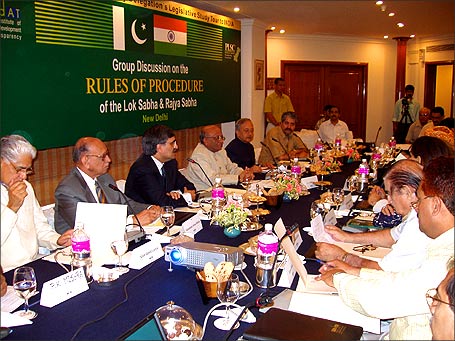
|
|
| |
|
|
| |
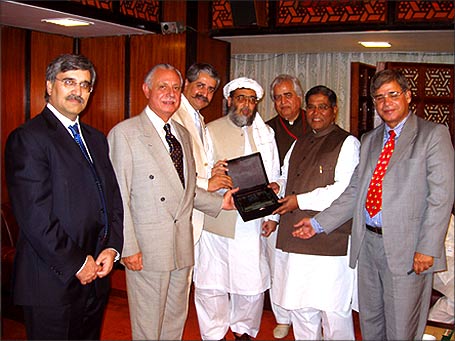
|
|
| |
|
|
| |
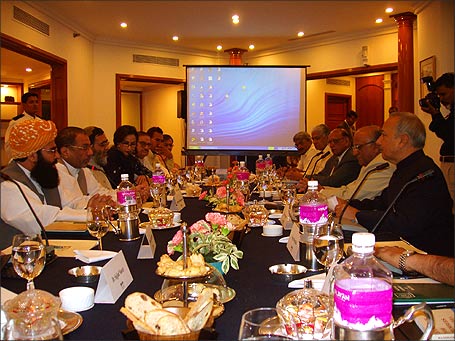
|
|
| |
|
|
| |
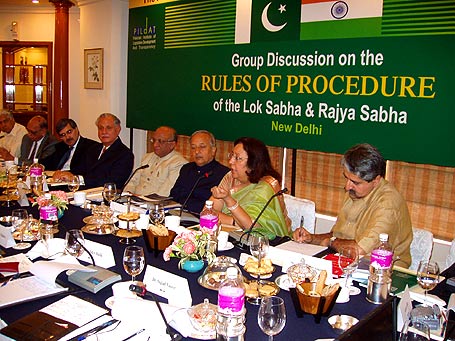
|
|
| |
|
|
| |
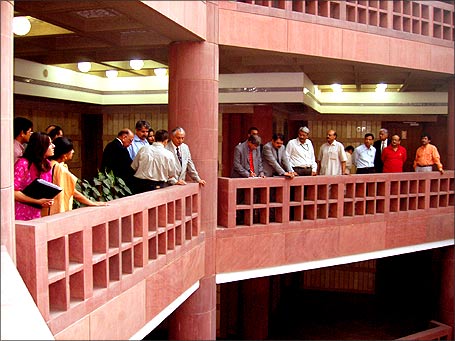
|
|
|
|
|
|
|
|
|